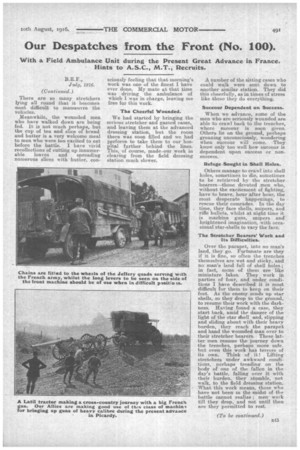Our Despatches from the Front (No. 100).
Page 11

If you've noticed an error in this article please click here to report it so we can fix it.
With a Field Ambulance Unit during the Present Great Advance in France. Hints to A.S.C. , M.T. Recruits.
B.E.F.,
July, 1916. (Continued.)
There are so many stretchers lying all round that it becomes most difficult to manoeuvre the vehicles.
Meanwhile, the wounded men. who have walked down are being fed. It is not much perhaps, but the cup of tea and slice of bread and butter is a very welcome meal to men who were too excited to eat before the battle. I have vivid recollections of cutting up innumerable loaves and spreading numerous slices with butter, con sciously feeling that that morning's work was one of the finest I have ever done. My mate at that time was driving the ambulance of which I was in charge, leaving me free for this work.
The Cheerful Wounded.
We had started by bringing the serious stretcher and gassed cases, and leaving them at the advanced dressing station, but the room there was soon filled and we had pprforce to take them to our hospital further behind the lines. This, of course, made.our work in clearing from the field dressing station much slower. A number of the sitting cases who could walk were sent down to another similar station. They did this cheerfully, as in times of stress like these they do everything.
Succour Dependent on Success.
When we advance, some of the men who are seriously wounded are able to crawl back to the trenches, where succour is soon given. Others lie on the ground, perhaps groaning unconsciously, wondering when succour will come. They know only too well how succour is dependent upon success or nonsuccess.
Refuge. Sought in Shell Holes.
Others manage to crawl into shell holes, sometimes to die, sometimes to be retrieved by the stretcher bearers---those devoted ,men who, without the excitement of fighting, have to brave, hour after hour, the most desperate happenings, to rescue their comrades. In the day . time, they face shells, snipers, and rifle bullets, whilst at night time it is machine guns, snipers and imagination, with occasional star-shells to vary the fare.
The Stretcher Bearers' Work and Its Difficulties.
Over the parapet, into no man's land, they go. Fertunate are they if it is fine, so often the trenches themselves are wet and sticky, and no man's land full of shell holes ; in fact, sonic of them are like miniature lakes. They work in parties of four, and under conditions I have described it is most difficult for them to keep on their feet. As the enemy sends up star shells, so they drop to the ground, to resume their work with the darkness. Having found a case, they start back, amid the danger of the light of the star hell and, slipping and sliding about with their heavy burden, they reach the parapet and hand the wounded man over to their stretcher bearers. These latter men resume the journey down the trenches, perhaps more safe. but even this work has terrors of its awn. Think of it! Lifting stretchers under awkward conditions, perhaps treading on the body of one of the fallen in the day's battle, falling over it with their burden, they stumble, not walk, to the field dressing station. What this work means, those who have not been in the ,midst of the battle cannot realize ; men work till they drop, and not until then are they permitted to rest.






















